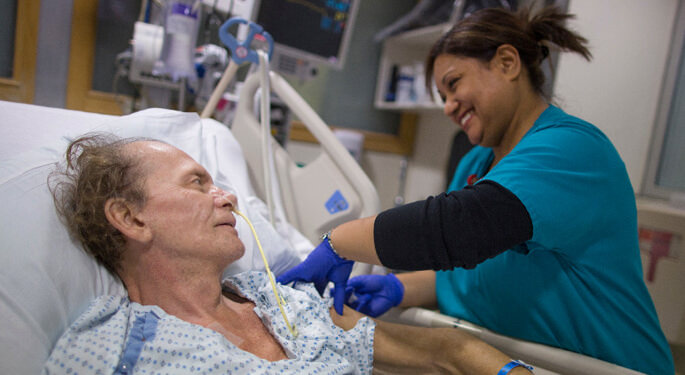Neurocritical Care



At the Mount Sinai Health System, we take a collaborative approach to neurocritical care. We have two area hospitals with dedicated neurosciences intensive care units (NSICU) staffed by board-certified neurointensivists (doctors who care for patients in the neurological and neurosurgical intensive care unit), as well as specialty-trained nurses, nurse practitioners, neurocritical care fellows, neurosurgery residents, social workers, rehabilitation therapists, pain care specialists, spiritual care specialists, and other support staff. Teams are available 24/7 to answer your questions and discuss the care of your loved one. In addition, our neurocritical care team collaborates closely with renowned experts in related areas including neurosurgery, neuro-endovascular care, stroke, and epilepsy.
In the NSICU, we treat a variety of types of patients, including:
- Acute ischemic stroke
- Subarachnoid hemorrhage
- Intracerebral hemorrhage
- Traumatic brain and spinal cord injuries
- Brain tumors
- Recovering from neurological surgeries and/or complex ear, nose, and throat procedures
- Neuromuscular emergencies including myasthenia gravis, Guillain-Barré syndrome, meningitis, and encephalitis
- Status Epilepticus including super-refractory status epilepticus and new-onset refractory status epilepticus
- Meningitis and Encephalitis
- Anoxic brain injury
- Coma
We develop plans for you, the patient, before and during as well as for recovery within the hospital and care after discharge. Your surgeon and care team will talk with you and your family about your individualized plan.
Coma Patient Monitoring
Our NSICUs use several monitoring devices to help us assess and observe the brain activity of patients. Research shows that patients who receive specialized care at an NSICU following a neuro-emergency (such as stroke or traumatic brain injury) or brain surgery achieve better outcomes, including a better quality of life, and shorter hospital stays.
If you or your loved one has experienced a neurological and neurosurgical illness, we monitor you very closely so that we can quickly detect and treat any potential problems. Patients in a coma may require non-invasive and invasive monitoring techniques so that we can carefully track what is happening and address it.
We use a variety of devices to measure intracranial pressure, brain blood flow, brain oxygen, abnormal electrical activities, seizures, blood pressure, and cardiac output. We also use radiological imaging as needed, including computerized tomography (CT) scans, magnetic resonance imaging, and angiographic imaging. The most common tools in the NSICU are:
- Therapeutic temperature management
- Intracranial pressure monitoring
- Brain tissue oximetry
- Cerebral blood flow monitoring
- Continuous electroencephalography
- Pupillometry
- Near infrared spectroscopy
- Jugular venous oxygen saturation monitoring
- Point of care ultra-sonography
- Transcranial doppler
- Invasive hemodynamic monitoring
- Magnetic resonance angiography
- Cerebral angiography
We use the Moberg System, which collects data at the bedside and helps us track trends, physiological relationships throughout the body, response to medications, ventilator settings, and the effectiveness of other interventions.
Patient Transfers
We accept neurosurgery and neurology patient from hospitals and health care facilities throughout the New York tri-state area. It is rare for a patient to be "too sick" to transfer in an ambulance to another hospital. The real risk may be in not transferring a patient soon enough. Ambulances are typically staffed by paramedics trained in advanced cardiac life support. There may be some risk while a patient is in transit, but we have to measure this against the potential benefits of beginning treatments as soon as possible.
Recovery and Rehabilitation
Once a patient has become medically stable and we complete all serious treatment, you start on your road toward recovery and rehabilitation. Our committed Mount Sinai neurocritical care, multi-disciplinary support teams, and therapists create individualized patient-specific treatments, activities, and goals to promote early activity, early mobilization, early removal of devices and catheters, and early weaning of ventilation.
Some neurologic disorders may cause temporary or permanent impairments. You may have problems with simple, daily functions or develop complex intellectual issues. Rehabilitation maximizes functional recovery and we begin as soon as we can after you become affected by the disorder or injury. Our goal is to help you to become as independent as possible.
We work with you and your family to plan your rehabilitation and discharge from the hospital. We understand that recovery and rehabilitation is a family affair and it greatly affects the lives of your primary caregiver and other family members and friends. For you, recovery often means learning new ways to perform old tasks. For your caregiver, it may involve adapting to and accepting you as you are now, including any permanent physical and/or cognitive limitations.
We use a variety of types of rehabilitation, including physical, occupational, speech, cognitive, psychological, and vocational treatment. These therapies maximize your physical strength and mobility, independence in performing activities of daily living (e.g. dressing, hygiene, and movement), ability to regain financial independence, reintegration into the community and social network, and psychological well-being.
Resources
There are many organizations that serve as valuable clearinghouses of information on a variety of medical conditions. Support groups for both patients and families are excellent forums to seek support, understanding, and guidance during this often-stressful and challenging time.
Society of Critical Care Medicine
Information for patients and their families on the critical care process, including medications, life support choices, making decisions, and after leaving the ICU.
Enhanced Recovery After Surgery
Information on care pathways designed to achieve early recovery after surgical procedures.
Mayor's Office for People with Disabilities
Working hand-in-hand with other New York City offices and other agencies to address the needs of people with disabilities and ensure that New Yorkers with disabilities can lead happy, healthy and productive lives.
Vocational and Educational Services for Individuals with Disabilities
Organization that starts with the presumption that all individuals with disabilities can benefit from vocational rehabilitation services and should have opportunities to work in jobs integrated within their communities.
Neurocritical Care Society
Society dedicated to neurocritical care with family and patient resources about neurocritical care, medical conditions, and members of the team.
American Stroke Association
Information and resources for patients who have suffered from a stroke and their families.
Coma FAQ
People in comas may look like they are asleep, but it is actually a very different condition. Coma is when the general state of the brain is submerged into a very low level of consciousness. When you are asleep, your brain is highly organized and there is a lot of complex electrical brain activity. Someone in a coma has slow electrical brain activity. In addition, while we can wake someone up from sleep, we cannot wake someone up from a coma.
Q. My family member is in a coma. Is there any hope?
Prognosis in coma can only be made on a case-by-case basis. More and more, we find that the outlook for comatose patients with severe brain injury may be much better than has we had thought. The key is to provide emergency treatment and resuscitation as quickly as possible.
The cause of the coma is very important. People who are in a coma because they consumed poison or experienced a metabolic abnormality often make a complete recovery. This isn’t necessarily the case for comas caused by other causes, such as vascular disease and or lack of oxygen. Head trauma falls between the two extremes. Younger people always have a better chance of recovering from coma than older people.
After several weeks in a coma, the chances of a full recovery decrease. It is important to realize that "waking up" after coma does not simply mean opening one's eyes or moving spontaneously. Instead, it means responding to commands or speaking coherently.
Q: Is there anything I can do to help my loved one who’s in a coma?
Although nobody knows for sure, it is possible that patients in coma respond to the presence of loved ones at the bedside. A familiar voice or touch may have a calming or reassuring effect. It certainly cannot hurt. We encourage you to spend as much time as possible with your loved one, as long as it does not interfere with medical care.
Q: How do you define coma recovery?
Recovery from coma means regaining the ability to consistently obey commands. Sometimes a patient might be minimally conscious, a state when patients sometimes follow commands and display varied alertness like eye contact. This minimally conscious state (MCS) is commonly seen as a transition state from coma or vegetative state.
Q: What is a vegetative state?
A vegetative state is when someone has been in a prolonged coma for more than a few weeks. Patients may be able to perform reflex behaviors (like eye opening, spontaneous breathing, sleep-wake cycles, startle responses, and body movements), but do not show signs of thinking. Patients may appear awake, but have no meaningful interaction with their environment. Recovery of conscious awareness after one year in a vegetative state is very, very rare.
Q: What is brain death?
A clinical diagnosis, brain death is the irreversible ending of all brain functions, including the brain stem. Sometimes a person who has experienced brain death is considered dead. The signs of brain death are:
- No signs of cerebral function (including behavior and reflexes above the spinal cord)
- No brain stem functions (no response in eyes, face, coughing or gagging reflexes)
- No ability breathe independently (without ventilator)
If we cannot properly examine the person, we may use other tests, such as an electroencephalogram, four-vessel angiography, or transcranial doppler sonography, to assess.
Q: What happens when someone has been declared brain dead?
Once someone is declared officially and legally brain dead, we disconnect the person from the ventilator, unless the family is considering organ donation.
Q: My loved one is in a coma on life support and the outcome doesn’t look good. They wouldn’t want to live this way. What can we do?
When someone’s bodily functions and organs begin to fail, we put the patient on life support. This is a temporary measure to provide care until the body resumes its normal functions. We consider life support to be harmful if it causes discomfort or prolongs the dying process without offering benefit. The decision to refuse or continue life support is a personal one, even if the decision might result in death. You should talk to your neurocritical care physician about the risks and benefits.
Most people decide to withdraw life support from their loved ones when they realize care such as ventilation, surgery, and medication will not prevent death, but will only make the patient suffer for longer. Family members make these decisions based on what they think the patient would want, or what the patient said or wrote down in advance.
Q: We have chosen to withhold treatment. What happens next?
Once it is agreed to stop aggressive medical management, we take comfort care measures, such as sedatives. These can reduce any potential pain and suffering once we withhold or withdraw life-support interventions.
Q: How does organ donation work?
Many families of patients want their loved ones to contribute to other peoples’ lives, even after death. Organ donation means taking the healthy tissues and organs from one person and giving it to another person.
Q: We would like to have our loved one’s organs donated. What are our next steps?
We have dedicated specialists from the New York Organ Donor Network for families of potential organ donors. In addition, our family service coordinator can answer any questions you might have.